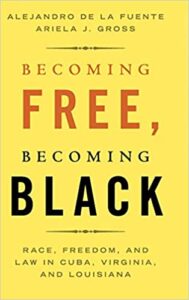In Print: Becoming Free, Becoming Black: Race, Freedom, and Law in Cuba, Virginia, and Louisiana
Becoming Free, Becoming Black: Race, Freedom, and Law in Cuba, Virginia, and Louisiana
(Studies in Legal History)
Cambridge University Press, 2020
Co-author Alejandro de la Fuente

Summary: How did Africans become “blacks” in the Americas? Becoming Free, Becoming Black tells the story of enslaved and free people of color who used the law to claim freedom and citizenship for themselves and their loved ones. Their communities challenged slaveholders’ efforts to make blackness synonymous with slavery. Looking closely at three slave societies—Cuba, Virginia, and Louisiana—Alejandro de la Fuente and Ariela J. Gross demonstrate that the law of freedom—not slavery—established the meaning of blackness in law. Contests over freedom determined whether and how it was possible to move from slave to free status and whether claims to citizenship would be tied to racial identity. Laws regulating the lives and institutions of free people of color created the boundaries between black and white, the rights reserved to white people, and the degradations imposed only on black people.
Praise: “In Cuba of 1860, many persons of color who purchased their freedom lived alongside slaves; while in Louisiana and Virginia free people of color had almost disappeared and to be black was to be enslaved. The difference was in the law and custom regulating freedom—law made by many hands, including those of slaves themselves. This book, based on meticulous archival research and brilliantly reasoned and written, is comparative legal history at its finest.” —Robert W. Gordon, JD ‘83, Stanford University
“In this incisive and spell-binding study, Alejandro de la Fuente and Ariela Gross meticulously investigate the archives of the ‘legal regimes of slavery and race’ in the culturally disparate locations of Cuba, Louisiana, and Virginia, thus exposing the differences and similarities between Spanish, French, and English approaches to manumission and interracial relationships. In addition, the authors brilliantly focus on the bottom-up efforts of the enslaved to gain freedom, thus exposing how these ‘unpredictable twists and turns’ established the meaning of blackness in law. Not only an important legal analysis, Becoming Free, Becoming Black tells many fascinating stories of heroic efforts to attain freedom through legal regimes.”
—Henry Louis Gates, Jr., Alphonse Fletcher University Professor, Harvard University
“Becoming Free, Becoming Black is a brilliant study of the making of race in the New World. Deeply researched, insightful, and smoothly written, this book is a major contribution to the scholarly literature on slavery and the way it shaped, and was shaped by, attitudes about people of African descent.”
—Annette Gordon-Reed, Charles Warren Professor of American Legal History, Harvard University, and author of The Hemingses of Monticello: An American Family
